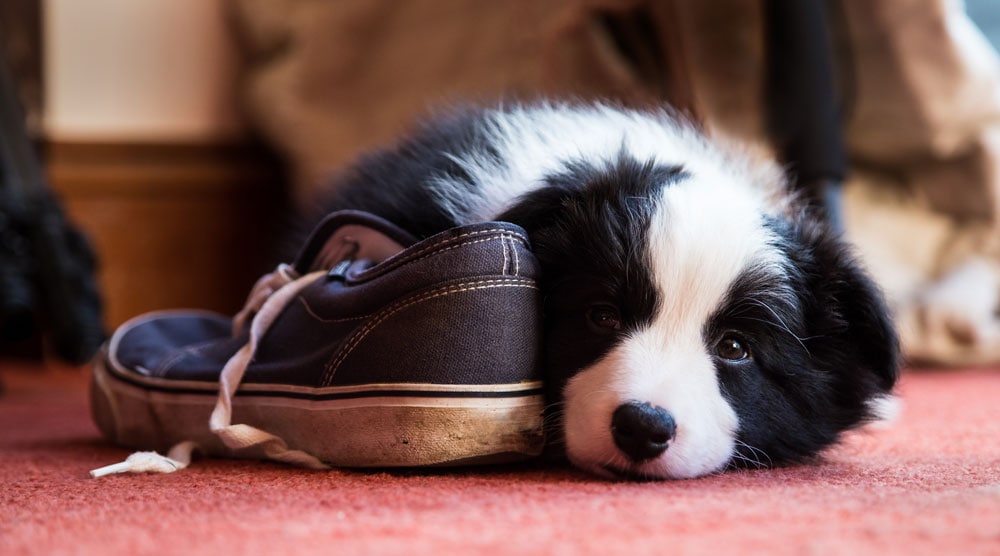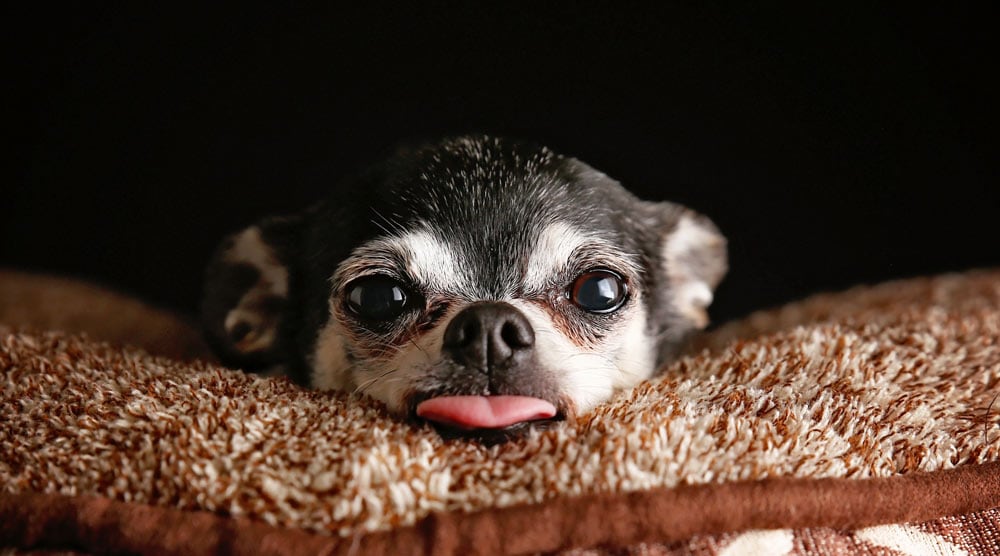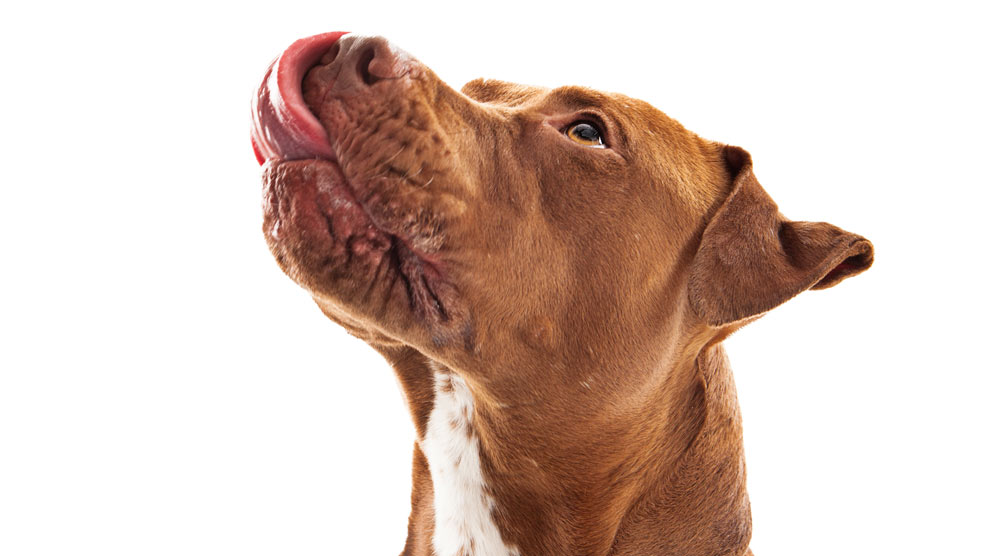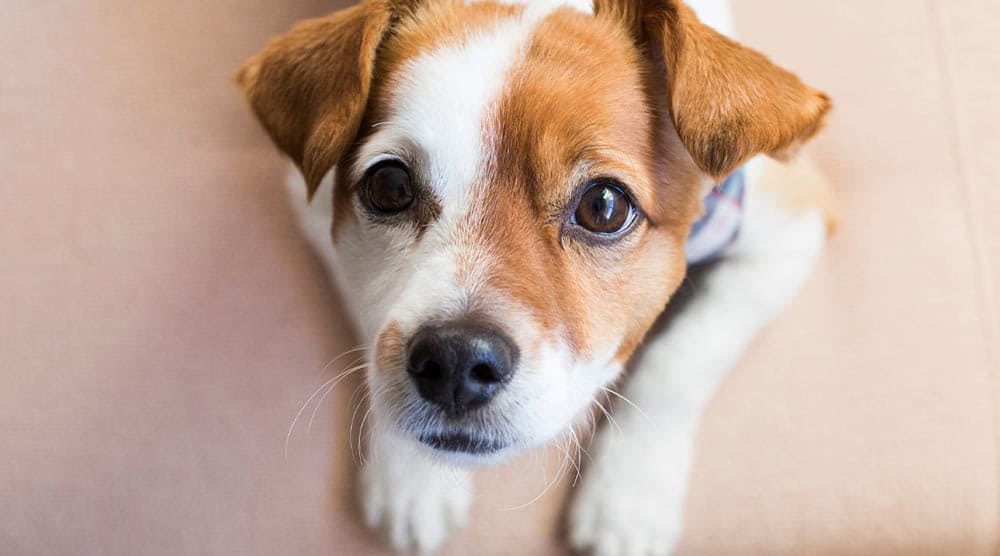Has your pup chewed a favorite pair of shoes? If so, you’re certainly not alone! Here’s why many dogs love shoes (and socks.)
Contents
After all, what could be better than a toy that’s soft, has an interesting shape, smells like their beloved owner, and maybe even has a leathery taste? That’s hard to beat!
In this article, we’ll discuss the common reasons for shoe chewing. We’ll also show you some methods for redirecting your dog’s chewing to more appropriate toys.
Why Dogs Love to Chew Shoes and Socks
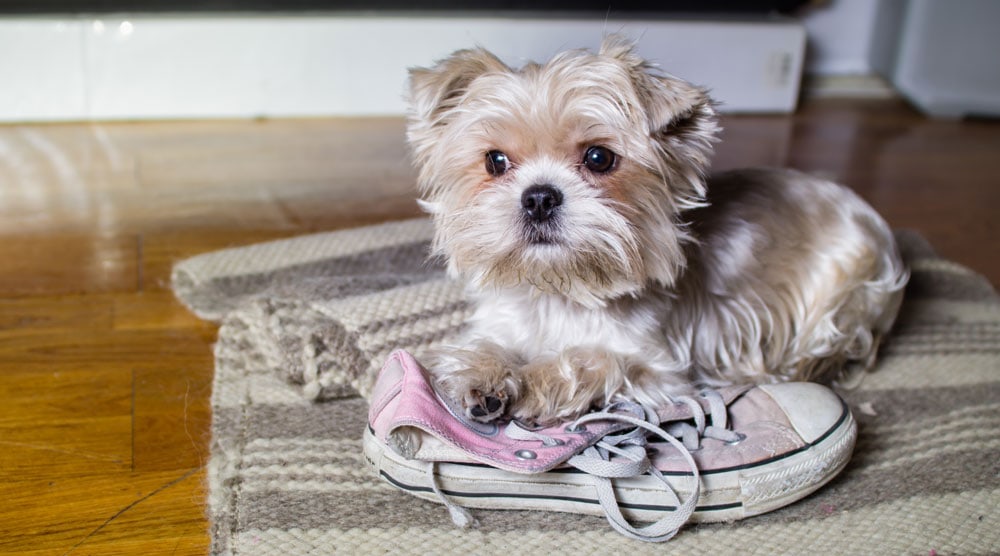
There’s no doubt that losing a pair of shoes to your dog’s sharp teeth is frustrating.
But before we go any further, it’s important to point out that chewing is a normal behavior for dogs. Unless chewing becomes compulsive or excessive, it’s a natural activity for your canine friend. It’s certainly not something that should be punished, or even discouraged.
However, your dog needs to chew appropriate objects – which your shoes certainly aren’t! Aside from being expensive to replace, shoes could be dangerous if your dog ingests some of the materials.
Let’s take a closer look at why dogs chew shoes and what to do about it.
They Might Be Teething
Puppies go through their teething phase at around four months old. During teething, the gums become extremely sensitive and painful, which causes the puppy to seek relief through chewing and biting.
Unfortunately for us humans, shoes are the perfect objects for soothing aching gums.
Not only do shoes smell like you, which provides comfort, but the soft yet firm material provides the perfect resistance for getting relief from teething pain.
Also, once the puppy has gained relief from chewing on shoes the first time, they are more likely to do it again. This leads to a self-reinforcing cycle, which can make chewing shoes a difficult habit to break unless you catch it early.
Puppies will chew any shoe when teething, but leather shoes are particularly attractive. The cattle-hide material tastes and smells good to a dog. Leather also becomes softer and tastier the more your puppy chews it, which provides an extra incentive.
You shouldn’t try to stop your dog chewing when they are teething. Instead, provide plenty of teething toys and keep your shoes where they can’t be accessed.
Tip: Remember, a puppy doesn’t “know” that a shoe is belongs to you (or even the purpose of a shoe). They aren’t being naughty when chewing something they shouldn’t – they are just trying to get relief from pain.
They Might Be Bored
Boredom is one of the most common causes of destructive chewing. And, as shoes are an attractive chewing object, they are often the first items a bored dog will target.
The solution is to provide your dog with more daily enrichment, but that doesn’t just mean a longer walk (which is a common mistake). While daily exercise is essential, it’s not enough to prevent a dog getting bored. Even if you go on a walk for an hour each day, that still means your dog is doing nothing for the other 23 hours.
Instead, you need to provide a combination of exercise, one-on-one attention, and mental stimulation.
Here are some tips for preventing boredom:
- Make sure your dog gets enough exercise. Every dog is different, so check your pet is getting the right amount of exercise for their age, breed, and health.
- Give your dog dinner in a puzzle feeder. These encourage your dog to use their brain to access the food, which is brilliant mental stimulation. Snuffle mats are also a great choice, as they activate a dog’s sense of smell.
- Provide chew toys. Aside from reducing the chance of your dog chewing a shoe or sock, chewing provides mental stimulation.
- Practice basic cues using positive reinforcement. Training is one of the best ways to tire out your dog without exercise. Even five minutes of training using positive reinforcement can be exhausting for many dogs!
- Play indoor games. Simple games such as hide-and-seek and gentle tug of war can be a lot of fun. For more examples, read our guide to 24 indoor games for dogs.
- Spend one-on-one time with your dog each day. There’s no substitute for giving your dog plenty of attention and love during the day. This is also essential for preventing boredom and frustration.
Boredom alone can cause destructive chewing. But shoe chewing can also get worse over time if you accidentally reinforce the behaviour.
For example, if you try to take the shoe back from a bored dog, this could quickly turn into a game of chase. You might not be having fun, but your dog probably is! Even if you’re upset or frustrated, a dog who is bored may still be relieved by the excitement and attention.
To prevent this, never react to your dog chewing your shoe. Instead, calmly distract them (perhaps using a treat or another toy), then take the shoe away once they lose interest.

How to Tell if Your Dog Is Bored
Boredom shares many symptoms with other behavioural issues, such as separation anxiety. Some of the most common signs of boredom in dogs include:
- Excessive chewing
- Anxiety and stress
- Following you everywhere
- Scratching
- Pacing
- Excessive barking
- Compulsive behaviours
If you suspect your dog is bored, try increasing the amount of exercise, attention, and mental stimulation they receive each day. If that doesn’t help, contact a dog behaviourist who can assess your pet for behavioural issues.
They Might Be Anxious or Stressed
Dogs may chew as a way to cope with anxiety or stress. Chewable items that carry your scent, like shoes, are particularly comforting for an anxious pup.
There are many things that can cause a dog to become stressed. We’ve written a full guide to canine stress, but some examples include noise, new objects, lack of exercise, strangers, or other dogs.
Another common cause of anxiety is separation anxiety. When a dog has separation anxiety, they experience extreme distress when left alone, leading to a range of destructive or undesirable behaviours.
Aside from chewing, other symptoms of separation anxiety include:
- Excessive barking, howling, or whining
- Urinating or defecating inside
- Destructive behavior including digging, clawing, and shredding
- Excessive panting or salivating
- Attempting to escape, potentially hurting themselves in the process
- Pacing and an inability to settle
- Anorexia
If your dog has separation anxiety, talk to your vet to make sure there’s no medical issue. If there’s no medical cause, contact a dog behaviorist, as this can be a difficult problem to solve without professional help.
They Might Be Hungry
Another reason for shoe chewing is hunger. If your dog isn’t getting enough calories in their diet, or perhaps isn’t getting the right balance of nutrients, they’ll be driven to look for anything that smells like food to chew.
If there’s no “real” food around, then your leather shoes could be an attractive target. Some dogs just chew them for the taste, while others will attempt to actually eat the leather. This can be very dangerous, as leather could cause an obstruction in the digestive system.
So, if your dog is chewing your shoes (or other objects), start by making sure they don’t have access to these items for their own safety. Then check they are getting enough daily calories using the guidelines on the food packet. Make sure you weigh the food for each meal, as it’s easy to feed the wrong amount when estimating.
Note: If your dog is on a calorie-restricted diet for their health, you should discuss ways to combat hunger with your vet before changing their intake.
They Might Have Pica
Pica is a condition that causes dogs to eat non-edible items. Shoes are a common target for dogs with pica, since they smell like their owners, which can provide a level of comfort.
There are several potential causes of pica, including some that we’ve already mentioned (such as boredom or anxiety). However, pica can also be a sign of a nutritional deficit or other medical issue, so it’s important to talk to your vet if your pet is trying to eat non-edible items.
If no medical cause is found, the best way to prevent pica is to remove the desired object and make sure your pup has plenty of alternatives for chewing.
Why Some Dogs Like to Sleep or Cuddle With Shoes
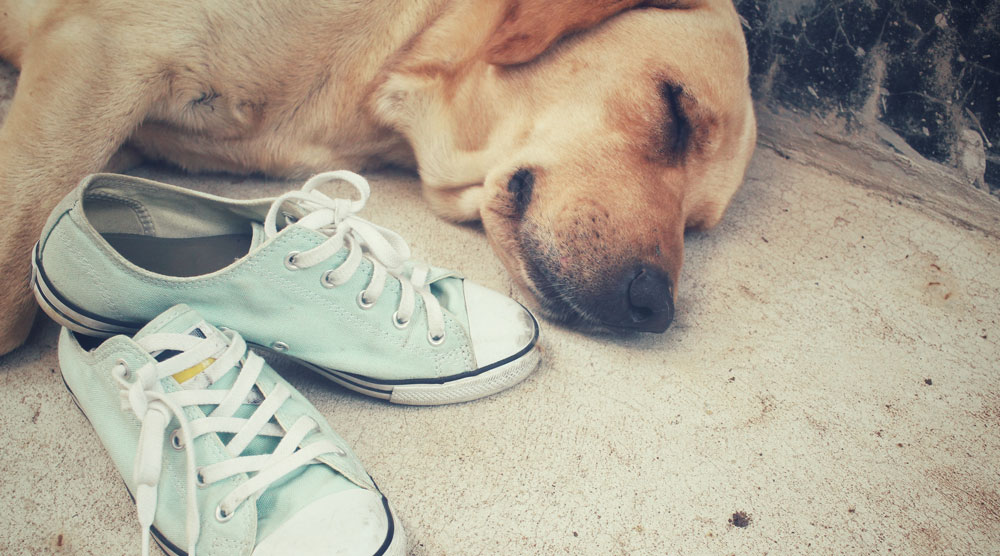
What if your dog just wants to sleep next to your shoes, rather than chew them?
The most likely reason for this behaviour is that your dog feels comforted by your scent. If you’re not nearby when they want to sleep, then your shoes or socks might be the next best thing.
It’s estimated that a dog’s sense of smell is 1,000 to 10,000 times more sensitive than humans, so they can easily pick up a scent on your shoes – even if you can’t smell anything.
While you might not think your shoes are comfortable to lay on, the comfort, security, and texture make them an ideal choice for your dog.

Tips for Preventing a Dog Chewing Shoes
If you catch your dog chewing on your shoes, it’s critical not to punish or scold them for this natural behavior. Your dog isn’t being disobedient or misbehaving – they don’t understand that chewing a shoe is “wrong”.
Instead, try to distract them with a toy or treat. Act like you don’t care about the shoe, to avoid it becoming a game, and don’t force the distraction onto them. Give them space and “play” with the toy or treat to make them curious.
When your dog drops the shoe, calmly take it away, before replacing it with something more appropriate to chew.
Here are some helpful tips for stopping your dog chewing your shoes:
- Keep your shoes out of reach. While it may seem obvious, the easiest way to keep your dog from chewing on your shoes is to ensure they can’t get to them in the first place. Keep them high up out of reach, in a closed bin, or behind a gate or closed door.
- Provide other options for them to chew on. Make sure your dog has plenty of other stimulating options to chew on, like squeaky toys or a flavorful bone or chew toy.
- Make sure they’re getting plenty of physical exercise and mental stimulation. If your pup gets the proper amount of activity needed, they’re much less likely to chew out of boredom. Check with your vet if you need guidance on the best amount of exercise for your dog.
- (For Puppies) Provide teething toys. Having teething chews will not only help relieve some of your puppy’s discomfort, but it will also help teach them what’s appropriate to chew on from a young age. Chew toys that you can freeze are also ideal for soothing aching gums!
Summary
In many ways, shoes are the perfect chew toy for a dog. They provide:
- Multiple textures (including laces to pull on)
- The scent of the dog’s owner
- Soft material that still provides some resistance
- An interesting shape
- Often a pleasant leather taste
So, it’s not surprising that shoes are often the first choice for dogs who need to chew! Whether the dog is chewing due to teething pains, boredom, anxiety, or even hunger, a shoe is always an attractive option.
Never punish your dog for chewing your shoes. Instead, manage the behaviour by keeping shoes out of reach, while providing plenty of tasty alternative (and safe) chews. It’s also important to provide enough mental and physical stimulation for your pet to prevent boredom.
Looking for something (almost) indestructible for your pup to chew on? Check out our list of 11 Nearly Chew Proof Dogs Toys!
